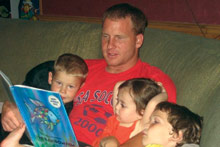A typical day in the life of Matt Buys includes driving, cooking, laundry, cleaning, volunteer work at an elementary school, and when the weather’s bad, indoor soccer games with his four kids.

Buys has been a stay-at-home dad for 13 years.
“I feel like my job is the best job in the world,” he says as he makes quesadillas for his kids’ after-school snack.
In the years that Buys has worked as his kids’ primary caretaker, he’s been joined in that role by more dads than ever before. According to the U.S. Census Bureau, the highest number of stay-at-home dads counted was 165,000 in 2007. That’s triple the number from a decade earlier.
What’s changed? For one, more women have joined the workforce while more dads have accepted that it’s no longer a stigma to be primary caretaker to their kids.
Or if it is, they’re dealing with it better.
Why dads do it
There’s been lots of hoopla around the “Mommy Wars”—career vs. stay-at-home moms—but there’s been relatively little discussion of why dads stay home with kids. While 169,000 stay-at-home dads might seem like a lot, that’s still a significant minority when compared to the 5.4 million stay-at-home moms.
Many Asheville dads say their decision to stay home boils down to finances. In other words, the female partner has a fatter paycheck, typically with benefits and/or a more reliable career. Also, they realize, regardless of which parent stays home, an extra paycheck might not cover the cost of day care or a nanny.
Asheville obstetrician Beth Buys birthed her oldest during her first year of medical school, while her husband worked as a freelance writer. Though they planned to put the baby in daycare when Buys’ maternity leave was over, Matt Buys says, “I couldn’t do it. I couldn’t put my baby in day care.”
Michael and Colleen Queeney are in a similar situation. Colleen’s job as a computer engineer in California had higher pay and better benefits than her husband’s accounting position. So when she got pregnant, the couple decided Michael would quit his job and stay home with the baby.
“I was really nervous after we made the decision. I kept thinking, ‘Oh my God, what have I got myself into?’” Michael says. “I had guy friends who couldn’t even change their kids’ diaper without gagging.”
He bought a pile of books and spent the four months before daughter Annie was born cramming for his new job. Initially, his wife worked from home. “I worked long hours, but I could nurse and be there for the kids’ first step, etc.,” she says.
A few years after their son, Ricky, was born, the Queeneys moved to Asheville. Colleen became vice president for engineering for software design company BUILDERadius.

Since then, Michael’s been a full-time stay-at-home dad to their two kids.
You can’t put baby in the corner
When Matt Buys decided to keep Zach at home, he says, “I thought I could put the baby in a corner and write. I didn’t realize he was going to be a full-time job.”
Buys admits he had no clue what he was doing initially.
“The first time I went shopping for diapers, it took me 20 minutes to figure out which kind to buy,” he says.
Then he mentions the challenge of potty training his oldest.
“I had no idea how to do it. Finally, I thought, ‘This kid really likes fireworks.’ So I told him every time he used the bathroom we’d go outside and set off a firecracker.”
Like their mom counterpoints, many stay-at-home dads welcome the opportunity to work part-time once the youngest child starts kindergarten.
Michael Queeney started a photography business from home when Ricky started kindergarten.
“I’m sure this is true for women too, but the first few years, when I felt like all I did was laundry and change diapers, I kept thinking, ‘I went to college for this?’” Michael says.
On the other hand, Buys says he’s sad about his youngest going to school next year.
“I’m not sure I’m ready for it,” he says. “She better have a kindergarten teacher who’s ready for dad to be in the classroom all the time.”
Asheville resident James Atkinson planned to go back to work next fall after more than two years as a stay-at-home dad, but he’s been stymied by the state of North Carolina’s change to the kindergarten cut-off date.
Atkinson became a stay-at-home dad when his wife, Melissa Lindholm, contracted cancer. After Lindholm’s death, caring for his young kids left Atkinson without time for a “real” job.
While Atkinson looks forward to having both kids in full-time school, it’s with mixed emotions.
“I’ve been so tied up with so many other things—settling the estate, running the household, grieving, potty-training—that I haven’t been as available to the kids as I’d like. I know they’ll remember reading books and throwing a ball with me, not whether or not they walked out the door through bread crumbs.”
Confusion in their eyes
Stay-at-home dads can face discrimination for not working a “real” job.
Buys says he initially faced prejudice from his extended family, although “Now they see how the kids turned out, they’re OK with it.”
Michael Queeney grew up in Huntsville, Ala., and says, “Whenever I tell my friends from home what I do, I see the confusion in their eyes.”
He says it’s gotten easier as he’s accepted his role and realized he’s good at caring for kids.
“I just embraced that this is now what I’m going to do, and I’m going to do it well. I’m responsible for the welfare of my kids, and I don’t want to screw it up,” he says.

Both Buys and Queeney note that stay-at-home dads rarely mention their job as dad first when someone asks, “What do you do?”
“They’ll say, ‘Oh, I do this part-time, and I used to do this, and, also … I stay home with the kids,’” Buys says. “It’s hard for some males to admit they do a job that’s traditionally a female’s job.”
As the numbers of stay-at-home dads have increased, so have their options for support. There are stay-at-home dad playgroups, Web sites such as www.rebeldad.com, and even an annual convention (this year’s will be in Omaha, Neb.).
That said, Asheville stay-at-home dads mostly hang out with stay-at-home moms.
Buys says he’s often the only male at school meetings or on the playground, but he’s become friends with most of the moms, and it no longer makes him uncomfortable.
Initially, Queeney says he didn’t want to ask moms for advice: “It’s kind of a male thing, I guess, like asking for directions. I didn’t want to ask other moms how to do things. I kind of felt like I was under the microscope. In hindsight, I realize that the moms were in the same position I was. They were probably just as nervous as I was.”
Since then, he’s become friends with a couple of single moms, who, he says, appreciate having a stay-at-home dad role model for their children.
Another Asheville dad, Andy Love, says he’s “kind of” a stay-at-home dad. He’s one of the many dads, not counted by the Census, who splits home schooling and kid-care with his wife.
Love says that he used to take his kids to a play group where the moms called him “Token” because he was the token male there.
“Now lots of families are in the same situation we’re in, in that one or both can work from home. This work flexibility has created more families like us,” he says.
While Buys says he adores his mom friends, he reports, “I do have to beware of estrogen poisoning. I have to make time to go ride my bike and watch football.”
Working moms chime-in
Colleen Queeney notes that she’s sometimes jealous that her husband gets more time with their kids.
“Some days I’d love to be home making cookies with them or playing tag,” she says. “But he’s such an awesome Dad. I can’t imagine changing places with him.”
She adds, “I love my job. I never imagined that this was how my life would turn out, but we’re so lucky it did turn out this way.”
Beth Buys notes, “I think if you work as a mom you’re going to feel guilty no matter what. And yet it’s a luxury for me that Matt loves being a dad. It’s not a compromise. It’s what he wants to do.”
Michael Queeney adds that being a stay-at-home dad has changed him for the better.
“I totally turned my life from being career-driven to truly being a more kind and thoughtful person. I’m much more likely to let someone cut into traffic in front of me.”
How dads are different
Although there are similarities between moms and dads, dads seem more likely to play rough and spend time outside with kids. They also stress less about cleanliness.
The data on stay-at-home dads
Experts predict the number of stay-at-home dads may rise significantly in 2009 as job losses will force some dads to stay home with their kids.
“The overall trend reflects the reality that more dads are staying home,” says Brian Reid, founder of the Web site Rebel Dad, which follows the stay-at-home dad trend. “Not all of them fit the strict Census definition, but there is absolutely a change going on in which it is normal—or close to it—for a guy to be doing the caretaking.”
He adds, “This is only going to be accelerated by the economic issues facing so many families today.”
U.S. labor statistics show the number of fathers providing their young children’s primary care is more like one in five—as opposed to the Census county of about half that number. In 2010, the U.S. Census Bureau will undertake a new count, and experts predict that the number of stay-at-home dads could be the highest ever.
Buys says he and a neighbor who’s also a stay-at-home dad play soccer for hours with their kids. And then there are the inside games, which recently resulted in a broken window at the Buys’ house.
In the Love family, mom oversees the academic part of home schooling, while dad’s in charge of extracurricular activities and sports.
Buys takes his kids on a rafting trip out West every summer, where, he says, “They learn to suffer.” He adds that they still have fun.
He also says the bar’s lower for dads, which he’s happy about.
“When dad shows up at the grocery store with dirty, scruffy kids, people think, “Isn’t it great that dad’s out shopping with his kids?’” Buys says.
When asked how life would be different if mom was at home more, 7-year-old Rachael Buys says, “We’d have to clean more.”
Matt laughs and tells a stay-at-home dad joke.
“A stay-at-home dad takes his newborn to his first pediatrician check-up. The doctor says, ‘My god, this baby’s diaper weighs a ton. You haven’t changed it in days.’ The dad replies, ‘The package says it’s good up to seven pounds.’”
[Anne Fitten Glenn writes the Edgy Mama column.]



Before you comment
The comments section is here to provide a platform for civil dialogue on the issues we face together as a local community. Xpress is committed to offering this platform for all voices, but when the tone of the discussion gets nasty or strays off topic, we believe many people choose not to participate. Xpress editors are determined to moderate comments to ensure a constructive interchange is maintained. All comments judged not to be in keeping with the spirit of civil discourse will be removed and repeat violators will be banned. See here for our terms of service. Thank you for being part of this effort to promote respectful discussion.